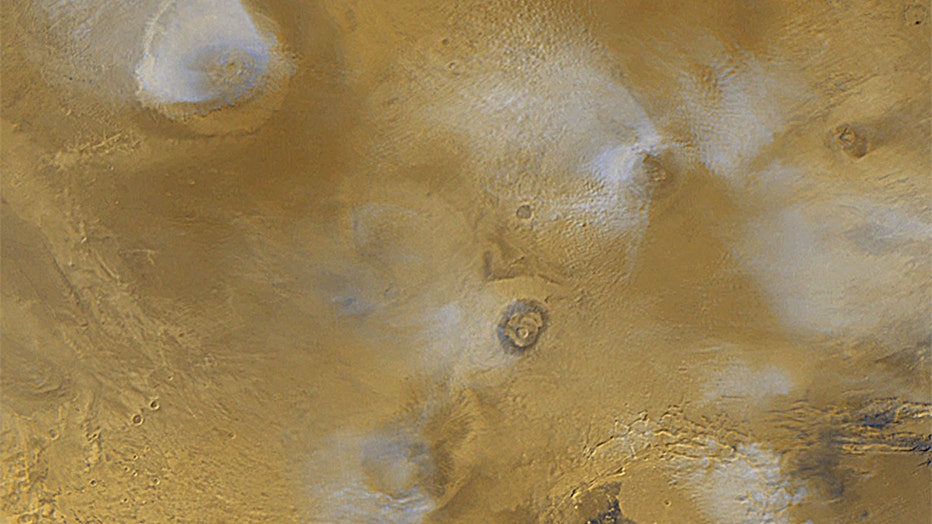Water frost found on Mars' volcanoes in 'significant first,' scientists say

Listen: The sounds of a dust devil on Mars
The sights and sounds from the surface of Mars. (Credits: NASA / JPL-Caltech / LANL / CNES / CNRS / INTA-CSIC / Space Science Institute / ISAE-SUPAERO)
A team of scientists has detected patches of water frost on Mars’ tallest volcanoes, challenging existing ideas of the Red Planet’s climate dynamics and providing key insights for future exploration.
According to a news release from Brown University, the discovery was made atop Mars’ Tharsis volcanoes, the tallest volcanoes in the entire solar system. Volcanoes in the Tharsis region are up to 100 times larger than those anywhere on Earth, according to NASA. The team’s study was published in Nature Geoscience.
It’s the first time frost has been found near Mars’ equator: researchers previously thought it was an "improbable" place for frost to form.

This 1999 image from NASA shows the volcanoes of the Tharsis region of Mars. (Photo by NASA/HO/AFP via Getty Images)
"The mix of sunshine and thin atmosphere keeps temperatures during the day relatively high at both the surface and mountaintop — unlike what we see on Earth, where you might expect to see frosty peaks," Adomas Valantinas, a postdoctoral fellow at Brown University, said in a statement. "What we're seeing may be a remnant of an ancient climate cycle on modern Mars, where you had precipitation and maybe even snowfall on these volcanoes in the past."
RELATED: Mars rover camera hit with charged particles after solar flare reaches planet
The study says frost forms for only a few hours after sunrise before it evaporates in sunlight. It’s only about as thick as a human hair, but it’s a lot of water – the equivalent of 60 Olympic-sized swimming pools, according to Brown University.
Researchers say modeling how the frosts form on Mars could reveal more secrets about the Red Planet – like where water exists and how it moves – all of which are needed for future exploration of Mars and finding potential life on the Red Planet.
RELATED: NASA has a new game plan for Hubble Space Telescope to resume science observations
The team of scientists analyzed more than 30,000 images from the Colour and Stereo Surface Imaging System (CaSSIS) onboard the European Space Agency’s Trace Gas Orbiter.
"This notion of a second genesis, of life beyond Earth, has always fascinated me," Valantinas said.

